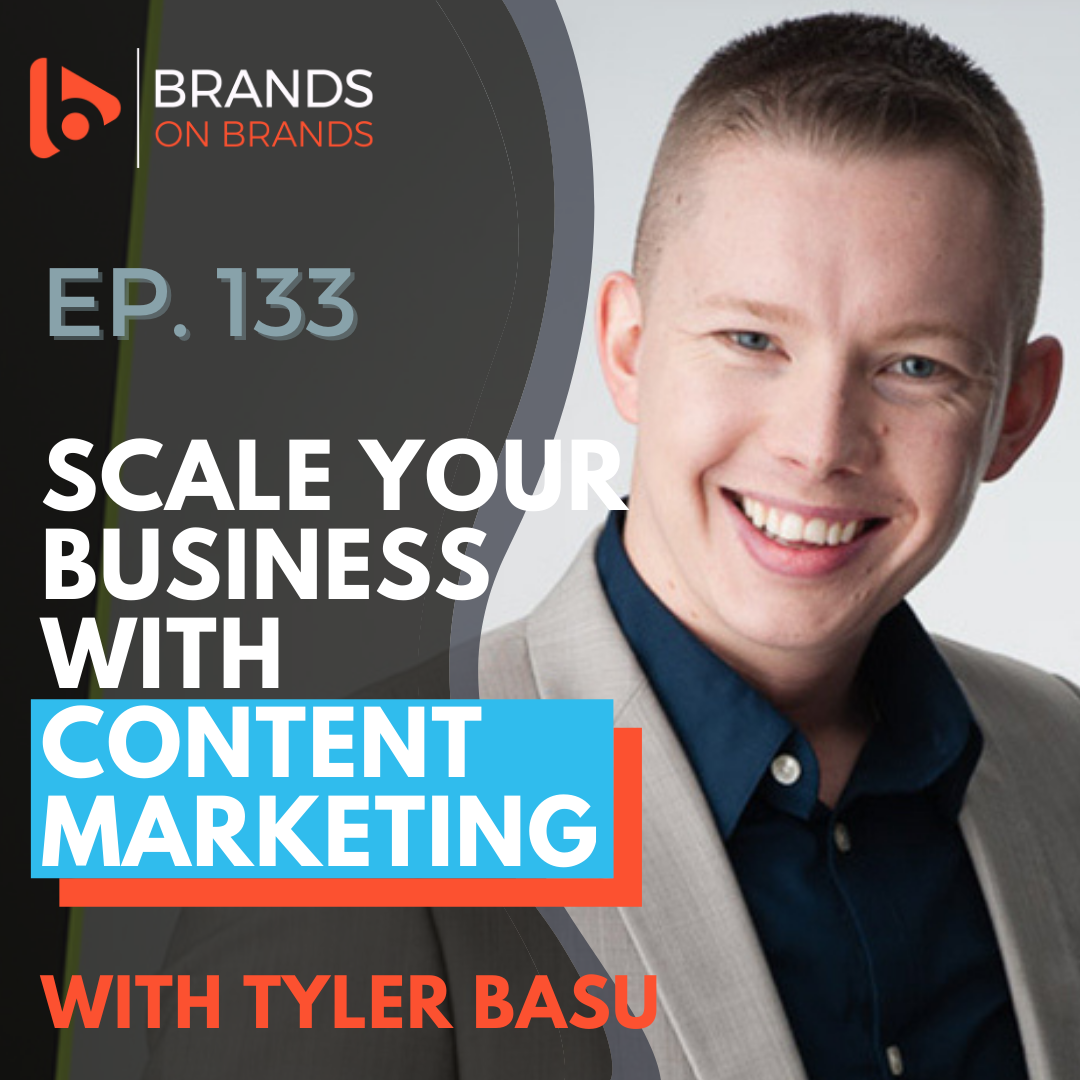Today we talk about why it’s important to build content marketing into your business, how to create it consistently, and how to build it the right way.
Our guest is Tyler Basu. He is a content marketing strategist for six to seven-figure businesses. He helps facilitate the creation of content, the repurposing of content, and the promotion of content.
Since 2013, Tyler has published over a thousand pieces of evergreen content online, driving millions of views, tens of thousands of leads, and thousands of customers for different clients and companies.
He’s also written dozens of online publications including articles for Entrepreneur, for Founder, for Influencive, for Youpreneur, Funnel Magazine, and the list goes on.
Not only that, but he’s also built his own company called Influence & Scale (influenceandscale.com) where they offer lots of free resources, as well as marketing training and other resources. He has a podcast called Influence And Scale. There, you can find things such as a free content strategy assessment.
You can look for ways to work with him, applying for marketing services that help you create content for your business. Whether you want to learn it from him on how to do it yourself, or you want him to do it for you, those are all things that they take on there.
CONTENT MARKETING STRATEGY SETS YOU APART
Brandon Birkmeyer: [00:04:32] What is the value of good content and content strategy? Why is this important?
Tyler Basu: [00:05:01] Here’s the thing. Pretty much everyone is a content creator now. Anyone with a phone can do it whether you’re active on social media, or you want to do your own YouTube channel or your blog or whatever the case is.
The barrier to entry is so low that you basically have competition no matter what industry you’re in, no matter what business you’re in, no matter what niche. No matter what you’re talking about, there’s a really good chance other people are also talking about that same thing.
IT GIVES YOU AN ADVANTAGE IN A SATURATED MARKET
Just being a content creator is not really an advantage. Being a good content creator with a strategy of how that’s going to serve you and help attract clients for your business, that’s what is required to make it work.
Otherwise, you’re just adding to the noise and you may never get the results that you want from your content if you don’t go into it knowing how to get those results and have the strategy for getting those results.
WHAT KEEPS YOU FROM STARTING YOUR CONTENT MARKETING?
Brandon Birkmeyer: [00:05:59] What I like to push out there to people is that there is power in understanding what your voice is, whether it’s you as a human or you as a business, but it’s harder than it sounds. What do you think keeps people from starting?
Tyler Basu: [00:06:33] Possibly the fear of the feedback? If you feel that you haven’t perfected your story or perfected your message, you are trying to avoid the trial and error of working through that.
In that trial and error phase, you might get some feedback you don’t like or attract some people that aren’t the right people for you. I don’t really know of a shortcut or a way to dodge that phase.
YOU HAVE PERMISSION TO BE IMPERFECT
I just think you have to accept that creating progress for your business and for your marketing or for your life, in general, is more important to you than getting it perfect. Just accept from the beginning, give yourself permission to be imperfect.

Give yourself permission to possibly say something that offends somebody over there, or that doesn’t resonate with this person over here. You can’t go lock yourself in a basement, not interact with the real world, and then come out of there with a perfectly refined message.
Refinement is made by taking action and getting feedback. Then you adjust based on the feedback and learn from the feedback. See it as a gift. If it’s the fear of feedback that is holding you back, just see it as a gift. Some of my best pieces of content that got the most views also had the most negative feedback.
I’m grateful for it. I learned from it, and it happened literally in proportion to the amount of people that saw the content. There is always a percentage that maybe aren’t going to resonate with it. I would say make peace with that, accept that. If you can just prioritize making progress over trying to be perfect from day one, go for the progress.
ADJUSTING IS EASIER THAN STARTING
You may never get perfection. Funny enough, you may think something’s perfect, put it out there, and then somebody points out that it’s actually not, and they didn’t like it. You might as well just give up on trying to be perfect to begin with.
Getting started is way harder than just making a quick pivot or adjustment. If you’re already putting content out there and you want to take it in a different direction, it’s easy to do that. Motivating yourself to start from scratch and attempt something for the first time is a little bit harder.
CONTENT MARKETING PRINCIPLES
Brandon Birkmeyer: [00:09:14] I want to nerd out on some tactics today, but let’s start with some high-level principles. If someone’s out there trying to build their business with content, what are things that you’d say are the principles to know for understanding the content marketing world?
Tyler Basu: [00:09:44] The biggest mistake is not defining the types of content that it’s going to take for you to guide somebody all the way through. From first learning about who you are and the fact that your business exists to then considering working with you and making the decision of if they want to buy from you or not.
YOU CAN NOT SHORTCUT THE BUYER’S JOURNEY
Do they want to buy your course, sign up for your coaching, or hire you for services? Whatever the case is, there are those three stages that a consumer goes through in every industry. You don’t get to shortcut it. This is what many people call the Buyer’s Journey or the Customer Journey.
They have to figure out who you are, consider what you’ve got, and then decide if it’s the thing they want to buy. There is content that can do each of those jobs.

The mistake that people make is that they’re creating the content that gets attention and completely dropping the ball on having the content (the pages or the funnels) that’s required to convert the attention into an actual customer.
RELATED: Build your personal brand with the Content Marketing Starter Guide.
DON’T MISS OUT ON POTENTIAL CLIENTS
I was once in line at a podcasting conference a few years back and I was talking to the person in front of me in the lineup. He had a podcast, so I was asking about his show. The guy had over a million downloads. I said that’s freaking awesome!
The average podcaster gets about a hundred downloads or something. This guy has a million. I said, “That’s amazing that you have the attention of a million people. That’s really freaking hard to do and you’ve done it. What’s the business model behind that? Are you generating revenue? What’s in it for you here?”
He said, “Oh no, that’s why I’m at this event. I’m trying to learn how to get sponsors for my show.”
You have a million people that you have the attention of, and you haven’t figured out how to extract a customer or revenue from that? I’m not trying to make the guy feel bad. This is the same story that I’ve heard from bloggers that have built their audience and they’re not making any money.
YouTubers can have a million views on a video and they’re making pennies from Google ad sense. The mistake that they’re making is that they created the content that got them attention, but they never created the content that gave that person a path to become a customer for something.
HAVE A CONTENT MARKETING STRATEGY THAT CREATES REVENUE
Even if they don’t have their own products and services, they could at least become an affiliate for somebody else and point people towards the recommendation of a product or service.
If you’re first and foremost an entrepreneur and you do have a product or service to sell, and your goal is to create content that brings in revenue, then yes, create the plan for generating awareness for your business.
However, make sure you’ve also thought through once you have somebody’s attention what you want them to do next. What’s the type of content or resource you’re going to give them in exchange for their contact info so you actually have a lead now that’s considering working with you?
Then what content are you going to use to help convert that lead into the sale? Not having those parts of the process defined and created, that’s probably the biggest mistake that I’ve seen entrepreneurs make and I would hope that I helped them avoid.
HOW TO CONVERT PEOPLE INTO CUSTOMERS
Brandon Birkmeyer: [00:12:51] I’ve seen the idea of taking content, then figuring out the next step, which is how do we convert them into a customer? I know in every business you have to choose the right model for them. What still seems to be working for people?
Tyler Basu: [00:13:38] There’s a really good question, and there’s no one-size-fits-all funnel or model that makes sense for every business or works in every industry.

If anyone tells you, “Hey, you have to do a webinar funnel. You have to do a free challenge or a free trial.” Whatever the advice is, if they’re saying, “Hey, you have to do this,” I would disregard that advice immediately and ask yourself, is that the right choice for my business?
Rather than tell somebody, “This is the type of funnel that’s working right now,” I would rather help people think through what type of funnel makes sense for them.
WHO IS YOUR CUSTOMER?
It starts with defining who is the actual customer you’re trying to get. Are you selling to another business? Are you selling to a consumer? What are you selling them and at what price point? Answer those questions first.
Once you have the answers to those questions, then you ask, what is the sales process? Is my sales process that I get on the phone and I do a free consultation or a strategy session? Is my sales process a free trial because I sell software?
What’s the mechanism that converts somebody who is ready to buy from you? They just need to see what the offer is. Define how you’re going to present that offer to them. Sometimes it’s content. Sometimes it’s a phone call or a free trial, and sometimes it’s content like a webinar pitch to your product or a sales page.
WHAT DOES YOUR CUSTOMER WANT TO SEE?
Define that based on how you think your target market would actually want to look at the product or service that they’re buying for the price point that it’s selling at.
You wouldn’t get somebody to watch a one hour webinar to sell them a $10 t-shirt. There’s a huge disconnect there. A checkout page would do.
Again, it could involve content; it might not. At the very end, if you’re selling on the phone, there’s content that salespeople can lean on. You can give a salesperson some testimonials that they’re allowed to show off, a frequently asked questions or case studies page, or some kind of literature or content that shows social proof.
That’s often the biggest objection a salesperson will get is, “Hey, everything you said sounds great. Can you show me some proof?” If you can, arm them with some content that would help them in that sales moment.
CREATE CONTENT MARKETING LEADS THAT DIRECT TO THE SALES
Before somebody gets to the sales process, you have to first get the lead. Now the question becomes, what kind of a funnel am I going to use to generate qualified leads that are then going to get directed to my sales process?
The question that I would have you ask is, what’s something (like a free resource) that you could give to somebody that helps them solve a problem, that in the process of solving that problem qualifies them to be a customer or a client.

For example, I just talked to a mortgage broker last week. His sales process starts with an application form for the phone call in the first place, but he can’t help somebody if they’re not prequalified to get a loan. If he’s talking to people that are in no way going to get prequalified, he’s wasting his time on the call.
In his case, a great way to generate leads is to give them some information on how to get prequalified, to just give them that training upfront.
“Hey, here’s what you need to do. Here’s how you clean up your credit score. Here are the forms you’re going to need. When you have all this stuff ready, reach out to us and we’ll process your application. We’ll get your pre-approved, but if you don’t have these things, we’re not going to be able to help you.”
BUILD TRUST WITH POTENTIAL CLIENTS
Whatever the things are that qualify somebody as your client that helps them, builds some trust with them, and are valuable enough that they would give you their contact info, that’s what you use to build your email list.
For some of you, that becomes a worksheet or a checklist. Maybe it’s a webinar. Some of you might need a free assessment or a quiz. Again, there’s no one size fits all, but I hope I’m at least passing on the way of thinking so that somebody can decide which type of mechanism makes sense for them.
CONTENT MARKETING STRATEGIES
Brandon Birkmeyer: [00:19:00] We’ve thought about what we’re trying to accomplish. We’ve built some type of sales engine and then some way of getting their information, which is this lead magnet. Now let’s back out to the content piece, creating something versus generating some kind of interest. What are some good strategies for creating content?
Tyler Basu: [00:19:55] There are a couple of parts to this. One is, what are you actually going to say? What are the topics you’re going to cover in your content? What’s your message that actually attracts your clients? That’s one part, the message itself.
The other part is, in what format is that going into? An article? Or is that going into a video, a podcast episode, or an ad? Whatever the case is, those are the two decisions.
QUESTIONS LEAD TO NEW CONTENT MARKETING IDEAS
We can unpack both if you want, but I’ll start with the one of how to choose the topics. Again, if you know who your perfect client is, I recommend that you actually have a profile or a persona of who you’re trying to attract as an ideal client, how you help them.
- What’s the outcome that you help them accomplish?
- What are all of the questions that they have about that thing that you helped them with?
- What are the challenges that they face?
- What are the fears they have about it?
- What are the beliefs that they have about it?
- What’s the goal they’re actually trying to accomplish?
List all this stuff out. These become your talking points when you go to record that video or write that up blog posts. You could take one of the most commonly asked questions and do a whole guide on it, or a whole video on it. That way when you’re putting the content out there, you’re not just giving away how-to advice.
FRAME YOUR CONTENT MARKETING TO ATTRACT CUSTOMERS
It’s helpful to give people education, but if you’re not tapping into why they should even give you their attention in the first place, then they won’t stick around long enough to learn the how-to advice that you’re giving.
You have to tap into, “Hey, why are you dealing with this issue? Have you experienced this problem? I’m here. Are you trying to get this goal? I’ve done this and I’ve helped other people do this. This is the process that can help you get there.”

You have to frame your content that way, and that will help ensure that your content is attracting the kind of person that is a potential customer and it’s repelling the people that it’s not relevant to. That’s perfectly fine.
DON’T BE INTIMIDATED BY OTHERS IN THE MARKET
Brandon Birkmeyer: [00:21:49] One of the things you said stood out to me. Create the content that you think answers the questions that your audience might already have.
What I imagine a lot of people are thinking is, this stuff’s been created already. There are already people that have answered this topic in quite some depth. They’ve created all these resources. That’s intimidating for a lot of people. So what do you say to that? What do you think about that?
Tyler Basu: [00:22:27] That’s very much going to be the case. Whatever your thing is, maybe you help people lose weight or get married, there are other people doing that. There are only so many ways to skin a cat.
One guy who’s doing really well right now is a guy named Chandler Bolt of Self Publishing School. They help people publish books. In the process of publishing a book, there are only so many ways you can spin that.
There are only so many ways you can teach people how to choose their book topic, write the outline, write the first draft, publish the damn thing, and market the thing. Those steps don’t change.
He’s giving the same advice that everybody else that helps people publish books is giving because the process is the same. How do you stand out if you’re giving the same advice that other people are giving?
HOW TO STAND OUT
Know that that’s okay. That’s probably going to be the case, but you’re not the same person as that other person. Just based on personality alone, communication style or something about them is going to attract certain people and something about you is going to attract certain people.
We could line up ten service providers of ten businesses and then pick out a prospect who knows about all ten of these businesses. The awareness thing is covered, he knows all of them. All ten of these businesses have case studies, client testimonials, and they all have a track record of doing the same thing.
Well, who’s he going to pick? Probably the one that he likes the most. So just be you. If you have ten competitors that are saying the same stuff and offer the same thing, that’s okay. That’s exactly why you produce content in your style with your stories that you have and your personality.
You’ll repel the people that relate to that other person over there better, and you’ll attract the ones that just like you. I think it’s as simple as that.
CREATE THE SAME THING YOUR OWN WAY
If you can articulate what you do in a unique way, and you’ve created a framework and given it a special name, that helps you stand out. That’s a huge part of personal branding–just taking your expertise and packaging it in a way that’s different from the way that other people have packages.
You may be helping people do the same thing. There are only so many ways to set up a Facebook ad or write a blog post, but giving your process a special name instantly makes you stand out.

Also, if you share your own stories and your own examples in your own methods, and that’s baked into the how-to advice that you put out there, nobody can copy that stuff. Nobody can steal your story. That’s uniquely yours.
Or talk about your client that you helped. They can’t do that. They can rip off your advice, but they can’t rip off the real examples and stories that you have. Any chance you get to put an actual story into the advice you’re giving will help you to stand out as well.
WHERE DO YOU POST YOUR CONTENT MARKETING?
Brandon Birkmeyer: [00:26:20] I do want to get into the channels themselves and the ways that we create. There are so many places we can do this, so many barriers and also opportunities across all these platforms. Can we talk about some of the things that you like that are out there, and opportunities you see for people creating right now?
Tyler Basu: [00:27:30] The main three types of content are your written content, your video content, and your audio content.
I mean, you could throw visuals in there too, as a fourth, (like images) but those are usually supported by a written post. You can’t just throw an image without any context. The context requires more content.
USE THE RESOURCES YOU HAVE
Of those big three, you need to ask yourself what do you actually have the resources and the skill sets to pull it off properly.
If you’re not a writer and you’re not interested in hiring writers, don’t tackle that. Maybe you’re great at talking but you don’t want to be on camera. Then podcasting is the best approach for you. If you’re comfortable or you’re willing to get in front of a video and you want to be the face of your brand or the face of your business, then doing video content could make sense for you.
Ask yourself, which one are you the most excited and kind of naturally inclined to create if you’re in fact going to be the creator of this content. Given the choice between all three, if you could say “Yes, I could do any of these,” in 2020 and beyond, I would definitely say start with video because video is what people are consuming.
VIDEO CONTENT MARKETING GOES FURTHER
The majority of the traffic online is people streaming videos and watching videos. All the social platforms want their users to stay on their platform and watch videos. LinkedIn’s given you really good reach if you put videos there. Facebook gives you a really good reach if you put videos.
I would say start with video, and then if you want to do the other stuff, do it by repurposing. Take your video and when the video is done, get it transcribed and give it to a writer. Have them do the article or strip the audio and give it to a podcast editor and make it an episode for your podcast.
But the best use of your time as the face of your business and as the person that has the expertise is to jump in front of the camera yourself. Plus it’s really cheap to advertise videos right now.
The cost to get somebody to watch a video when you put some ad dollars behind it, (whether you do that on Facebook or YouTube or whatever) is down to a few cents to get a viewer of a video.

You can grow your audience fast if you compare that to trying to grow a blog from scratch with no ad budget or starting a podcast with no promotion. You’ve got a budget that you’re willing to spend to promote your stuff. If you take that budget and spend it on promoting video content, that money stretches a lot further.
MORE ABOUT TYLER BASU
Brandon Birkmeyer: [00:29:59] You’re out there offering your help to people with this kind of stuff, with creating content, marketing and strategy, building the tools they need to do this successfully. Tell me a little bit about how you help people and where people listening can find you.
Tyler Basu: [00:30:39] My business partner, Chuck and I, have an agency called Influencer Studio. We do content marketing as a service. What that means is we’ll take somebody’s content that they’re already creating.
We’ll do the repurposing and promotion for them to help build their audience. Once they’ve got an audience, we can run ads to get leads from that audience like retargeting campaigns and stuff. Those are our services.
OTHER WAYS TO WORK WITH HIM
If somebody is not quite ready to dive headfirst into growing their audience and spending money on ads, (going back to what’s closest to the money of having a sales process and having the right funnel) if those things aren’t there we’ll work with them in a consulting capacity.
We’ll get that stuff built and then hand them over to do the content marketing and the ad management stuff.
Those are the services we provide. We’re putting out a lot more training this year too. We put out some free training, a lot of free resources, and we’re working on a course as well that we’ll have to teach this content marketing stuff to other businesses.
Find me on social media, @tyler.basu I’m the only guy with this name. You can find me pretty easily. Our website is Influenceandscale.com There are some free resources there that you can grab if you want to learn about content marketing.
Brandon Birkmeyer: [00:31:55] It helps to have a name that no one else has.
Tyler Basu: [00:31:58] My last name, Basu, is from my grandfather who’s from India, so this is a Bengali name. There’s no Tyler Basu in the world because it’s a white first name and a Bengali last name.
I found some white guy with the last name, Basu, in America. He had a different first name than me but was literally the only other white person I’ve seen on planet earth that had the same last name as me.
HOW TYLER BASU GOT INTO CONTENT MARKETING
Brandon Birkmeyer: [00:32:24] You were out there building content for actual real companies, You were in real estate for a while, and you worked at a course creation company. Tell me a little bit about why marketing started to catch your interest and why this is something that you’ve decided to keep diving into.
Tyler Basu: [00:33:14] I got into this field sort of by accident. At first, creating content was a hobby for me, coming out of college and getting into real estate. I worked as a realtor and I was selling stuff for developers.

It was in that period of my life from about twenty-two to twenty-five years old that I was going to seminars. Then somebody at this one seminar said, “It’s not about what you know, it’s about who you know, and who knows you.” I thought, oh man, nobody knows who I am, nobody!
WHAT IS EXCITING TO YOU?
To solve that problem, I started a blog and started writing articles. Then I started a podcast and started interviewing entrepreneurs. I published a couple of eBooks on Amazon. By 2015 I had created enough content that I was decent at it, but it was still just a hobby. I was still working as a realtor.
In 2015, just before my son was born, I decided, you know what? I like this content stuff better. This is more exciting to me than doing open houses on the weekends.
I made the decision to leave real estate and started a digital magazine. That was my first attempt at charging a subscription for content. Burned through all my savings within a few months trying to get that going.
Then I ended up looking for work creating content for other businesses. That led to getting the job offer at Thinkific, which is the online course software company. I worked as their content manager for three years, producing hundreds of pieces of content.
WHAT CREATES PROFITABILITY?
During that time, tens of thousands of leads and thousands of customers all came in. By the time I left Thinkific, they were up to over 30,000 customers and they hadn’t even hired a salesperson yet.
All those customers came through content, free trials, partnerships, and word of mouth. Those were the main four sources of customers. That’s where I really cut my teeth and learned how to not create content as a hobby, but actually be accountable to, “Hey, is this bringing in traffic? Is this bringing in leads? Is this content getting people to sign up for our software?”
I had to create those frameworks and those processes for how to do this profitably. After my second child was born, (my daughter) was when I started making the plans to go back to doing my own thing. January 2019 was my last day on the job where I jumped into running the agency with my partner, Chuck, full time.
Brandon Birkmeyer: [00:35:29] I love the guys over at Thinkific. That’s a legit company now these days. It’s cool that you were there to see it start.
Tyler Basu: [00:35:37] It’s a great company, man. There are over a hundred people there now. I was employee number 12. In that year, there was a hiring spree. The marketing team grew from around two people to ten or fifteen people in that year.
Most of those people are now off doing their own thing. Thinkific was this incubator for all of these people that are off running their own businesses that I’ve become really good friends with.
HOW TYLER BASU STARTED HIS OWN BUSINESS
When I left Thinkific, there was the temptation for me to jump straight into creating a course. There’s this wave of people creating courses online right now. Hundreds of thousands of courses have been created.
Most of them aren’t going to make much money. I’ve seen data on this. Most courses created, just like most bloggers, YouTubers, or most people who write a book, the majority of the revenue goes to the smaller percentage of the people in that market.

I paid attention to Thinkific’s most successful clients. What did they actually do right? Most of them, before they created their course, built a real business selling services, freelancing, or working with people one-on-one.
They didn’t wake up and decide, “I want to be an entrepreneur and I’m going to sell courses.” They went and helped people first. That was how they developed their content, proved that their stuff worked, and got their case studies.
Then they worked their way to creating their course when they felt like they had tapped-out working with people one-on-one.
I took that same approach when I left Thinkific. I had created courses before and would have loved to create one, but I decided no, I’m going to sell services first and go out there to actually establish a track record of helping other people get results.
I’m going to take a bunch of clients through all these calls, all my frameworks, and all my ideas for how I think we should do that stuff. Then when I feel like I’ve proven that this stuff works and that I can transfer knowledge to another person, that’s when I’ll go and create a course.
It’s about a year and a half later that I’ve been selling services. Now I’m just starting to put together an online course, after having tested my stuff on real clients.
YOU HAVE TO PROVE YOUR IDEAS WORK
It’s more work, and it might be less exciting than jumping straight to creating a course or creating content, but just because you did something a certain way and it worked for you doesn’t necessarily mean that it’s going to work for somebody else.
I think that you should do yourself the service of proving that you can transfer your process to another person before you teach it to them. Work with them, maybe in a one-on-one kind of way, or as a service provider, as a freelancer.
Prove that it’s transferable and that it works for somebody else. Then you go and teach it. Otherwise, you’re going to end up teaching people things and there are going to be gaps in your content.
They’re going to get stuck and you’re not going to know why they’re getting stuck because you never got the feedback loop from somebody that you worked with in real-time.
HOW TO MARKET YOUR PODCAST
Brandon Birkmeyer: [00:39:53] I found podcasting is not built on the backbone of something like Google that helps its creators. You create a video on YouTube and they help people find your video. You write a blog, and Google Search helps people find what you’ve written.
Podcasting doesn’t have that same helpful tool. It’s on Apple, Spotify, Google Play, et cetera… However, the searchability of the stuff you’ve created isn’t bringing your stuff to as many people.
You’ve gotten to talk about how you help promote your shows. What do you think is a good way to start getting the word out? What’s a good way to start taking what you’ve created and helping people find it?
Tyler Basu: [00:41:21] If your primary form of content is a podcast episode, there’s definitely extra onus on you to promote it.

As you said, just the way that the technology is set up, (and now there are over a million podcasts as of a few weeks ago in the world) the chances of somebody searching for a keyword on iTunes and finding you, it’s just not really set up that way.
You really have to take control over promoting your show. The answer is repurposing. Take clips out of your show, take some of the quotes from your episode and go make an audiogram, (one of those videos where you hear the voice from the episode or the sound from the episode). Put that on social media.
Pull quotes, put them into images, and put those on social media. Do a really good show notes page, or turn it into an article and get that on your blog where you embed the episode. You have to take control of how you’re going to promote your show.
PODCASTS ARE NOT GREAT FOR DISCOVERY
I’ve thought through this quite a bit because without giving it too much thought, I used to think podcasts belong at the top of the funnel. That’s where you’re building awareness.
Then I questioned myself on that. Have I discovered anybody that way? Have I ever actually done a search and landed on a podcast and that was how I first discovered somebody?
Or did I discover them on social media or on YouTube, on a blog post, and then learn that they had a podcast and then subscribe to their podcast? In that sense, the podcast kind of belonged in the middle of the funnel.
I already knew who that person was and made a conscious choice to learn more from them, to subscribe to their show until I like them, and trust them enough that I’m going to buy from them.
PODCASTS ARE EXCELLENT FOR TRUST-BUILDING
Last year, 2019, I spent probably over 30k just on one company on their masterminds and courses. Everything they had, I bought it all.
I asked myself, how did I become their customer? Did I see an ad, go through a funnel, and book a call? Not really. I saw an ad, and more ads. I started spying on them and started following them on social media. Grabbed some of their free resources and found out they had a podcast, so I binge listened to their podcast for about six months.
Then I pulled the trigger on one of their products. The podcast, in that sense, didn’t help me become aware of them. It helped me feel like I was building a relationship with them.
When they had put so much value into me as a podcast listener, they gave me so much great content. I felt like I knew these guys, even though I never met them in person. There was such a high level of trust that I was willing to drop that kind of money on buying their stuff.
If your goal is, “I want to grow my audience,” podcasting is one of the harder ways to do that. However, if your goal is, “I want to nurture the audience and go deeper in that relationship, earn their trust over a few months so that they feel comfortable buying from me,” I think a podcast is probably one of the best, if not the best way to do that.

Again, as a recap, you have to promote your podcast episodes. Don’t hit “publish” and hope people are going to find it. You treat it like somewhere in the middle of your funnel where you’re nurturing the audience that already knows who you are with your content.
Brandon Birkmeyer: [00:44:42] I think that’s one of the better ways I’ve heard it put. The idea is, what is it that you can use it as your content engine, right? You need something that’s easy for you to create from so that you actually continue to do it all the time.
For me, it’s easy to create a podcast, but I don’t rely on a podcast to generate discovery. I rely on what I take from it and put out there into the world to bring them into my world.
Tyler Basu: [00:45:35] Yes. Going back to that guy who built it and got a million listeners, there was no path for those listeners to become a customer. Don’t make that mistake either. Have the plan for the growth of your audience which is going to require promoting your podcast.
You’re not the only podcast in the world. There are lots of them now. Have a plan for how to guide that audience, (that now knows, likes, and trusts you,) to get them to consider your product or service.
Brandon Birkmeyer: [00:46:03] I know we’re coming towards the back of the show here. Is there anything you want to leave the listeners with before you go?
Tyler Basu: [00:46:20] Don’t let perfectionism stop you. Just create stuff, even if it’s not perfect. Get real feedback. Then improve and refine what you’re doing accordingly.
If you have any questions, feel free to reach out.
WHERE TO FIND TYLER BASU
Website: influenceandscale.com
Podcast: influenceandscale.com/podcast
Social Media: @tyler.basu
MORE ADVICE AND INTERVIEWS
If you’d like more content about how to build your personal brand, check out my free Content Marketing Starter Guide.
And here are some more of my most popular thought leader interviews!
- What Business to Start with John Lee Dumas
- Personal Branding Masterclass with Chris Ducker
- Built to Serve with Evan Carmichael
Don’t want to miss the next thought leader interview? Subscribe to the free B-team Insider Newsletter! And don’t forget to leave a rating and review on iTunes.
Talk soon!
